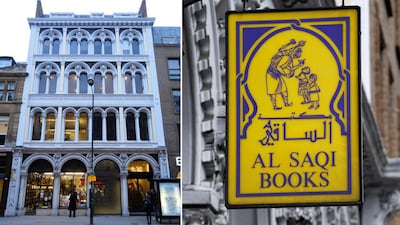London’s oldest Arabic bookstore is set to close after 44 years due to “unsustainable” costs stemming from economic challenges.
Al Saqi Books in Bayswater has overcome various setbacks in the past including smashed windows during the Second Gulf War and after the publishing of Salman Rushdie's controversial The Satanic Verses, but recent global factors have proved too much.
The shop, which has for decades been the go-to for Londoners seeking the best fiction and non-fiction from Middle Eastern authors, will shut this month.
Salwa Gaspard, owner and director of Al Saqi Books, told The National that the price of sourcing products from overseas has been creeping up, placing the shop under mounting pressure.
“The economic situation in the UK is not the only problem,” she explained. “We used to get our books from Arab countries and it’s become more and more expensive.
“We cannot continue as it is, it’s not sustainable."

The shop has in the past faced censorship crackdowns and had its windows smashed by activists who opposed its decision to stock certain books. The business also suffered heavily due to a bombing of its warehouse in Lebanon and a naval blockade during the 2006 war in the Middle Eastern country.
In the summer of last year, the bookshop’s basement was filled with water during flash floods in parts of the UK capital. A crowdfunding campaign to repair the damage raised more than £15,000 in only two days, attracting support from the likes of Mary Beard, a Wolfson Prize-winning author.
At the time, she hailed Al Saqi as “a great bookshop and publisher at the forefront of opening up high-quality books about the Middle East and North Africa”.
Ms Gaspard said the recent economic turmoil blighting Lebanon has made sourcing books “all but impossible” because prices in the nation “have increased dramatically”.
“Publishers have had to raise them to stay in business as paper and shipping have effectively doubled in cost,” she said. “Another factor is the exchange rate, which is no longer favourable to us — we used to pay in US dollars.”
She said the cost-of-living crisis in the UK heaped further pressure on the shop as running costs “have become too high”.
Staff had noticed a “drop in sales”, which she believes is partially attributable to the fewer numbers of Arabs visiting London.
Ms Gaspard also cited Brexit as a telling contribution in the shop’s demise.
“Brexit has been detrimental to our business — we used to sell many books to the EU, which is no longer feasible because of duties and such,” she said.
“Arabic libraries in the UK — another important part of our business –— are buying far fewer books. And we have lost a large part of our customer base as Arab visitors from overseas are not visiting in the same numbers. There is a generational issue there, as well: younger people do not stop by as often as their parents did.”
The bookshop was opened in 1978 by Salwa and Andre Gaspard, along with their lifelong friend, the late Mai Ghoussoub. The trio had settled in London after fleeing Beirut during the Lebanese Civil War.
Over the next four decades, the Bayswater business earned a solid reputation as a reliable source of high-quality literature from the Arab world. It attracted Arab expats as well as visitors keen to get their hands on books banned in their own countries.
Ms Gaspard said despite the unfortunate circumstances behind the closure, she would look back on its years with pride.
“Our customers’ support and friendship over the years has meant the world to me,” she said. "I have been very proud to be able to bring the best in Arabic writing and intellectual thought to readers eager to explore the Arab world’s rich heritage, and to serve such a warm and generous community."
Al Saqi Books is holding a final sale of its stock until the end of the year before it closes it doors for the last time.


